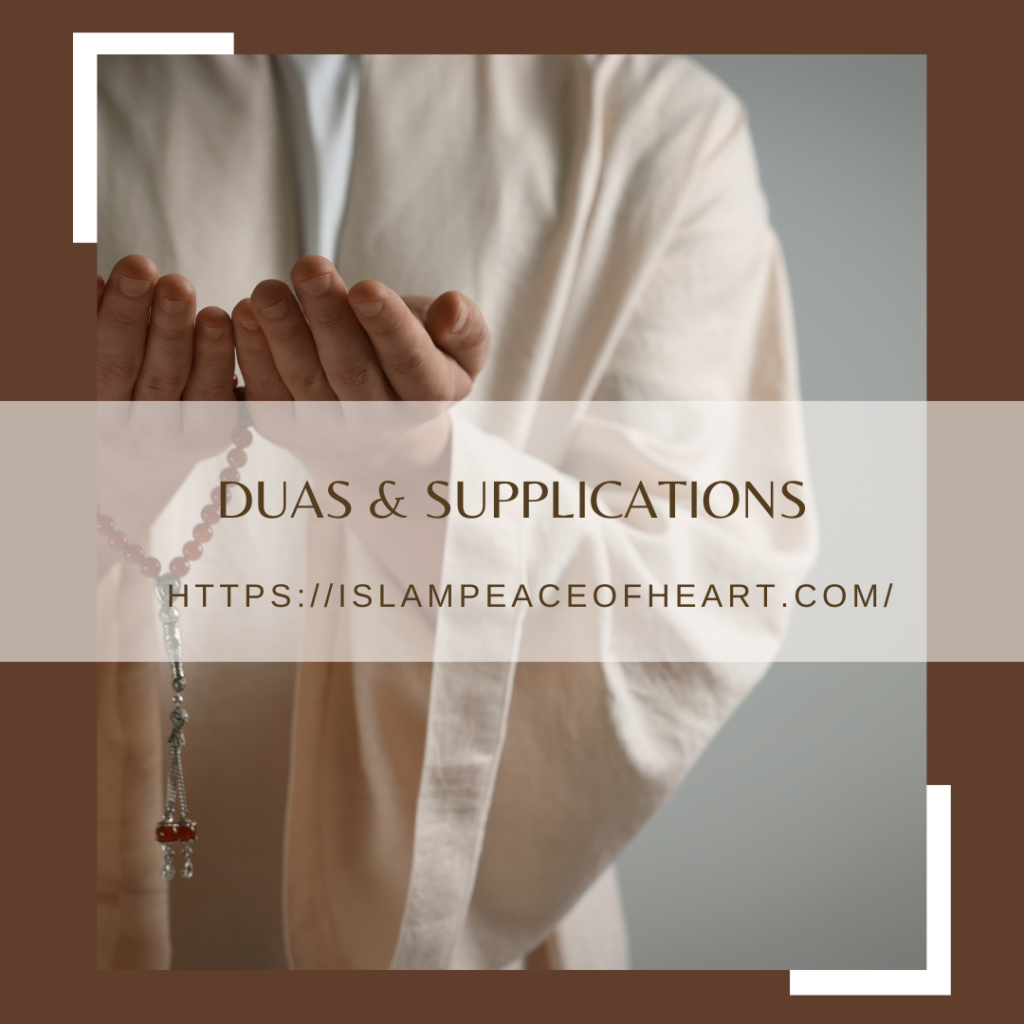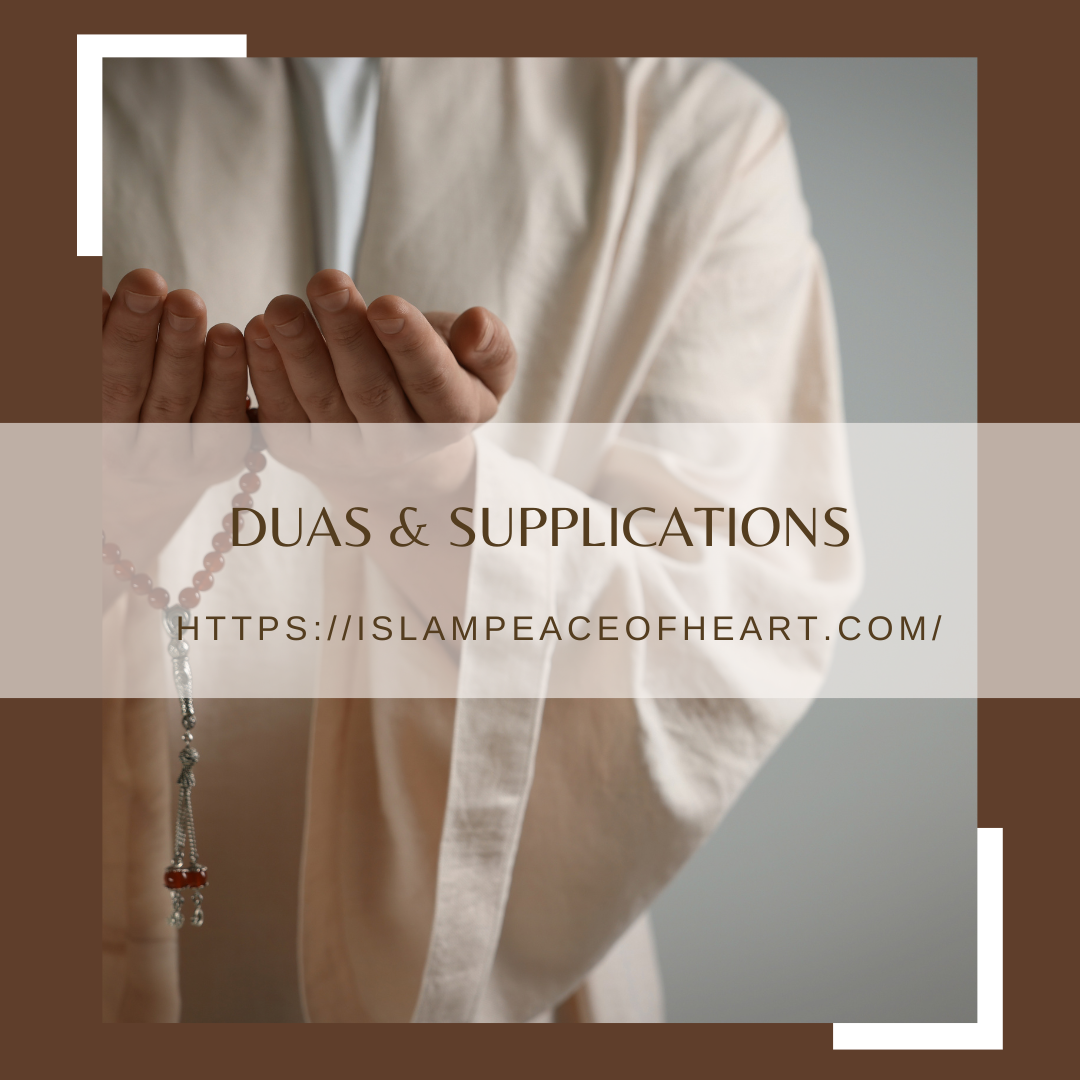Duas & Supplications
Introduction:
In the rich tapestry of Islamic spirituality, duas (supplications) hold a place of profound significance. they’re not merely ritualistic practices but deep, intimate conversations between a believer and the writer. Duas encompass various emotional and spiritual expressions, from earnest pleas for assistance to heartfelt gratitude. this article delves into the essence of duas, exploring their significance, kinds, etiquettes, and the profound impact they have on the believer’s existence.

The Idea Of Dua In Islam:
In the Islamic context, Dua refers to invoking Allah for advantages, steering, forgiveness, and help. it’s far a crucial element of worship and displays a Muslim’s dependence on and belief in Allah. The Quran and Hadith emphasize the significance of dua, highlighting it as an effective device for spiritual increase and a method to achieve closeness to Allah.
Quranic Angle On Dua:
The Quran often encourages believers to name Allah, promising that their supplications may be heard and replied to. One of the most poignant verses that underscore the significance of dua is found in Surah Al-Baqarah:
“And whilst My servants ask you concerning Me, certainly I’m close to. I reply to the invocation of the supplicant while he calls upon Me.” (Quran 2:186)
This verse encapsulates the essence of dua, offering it as a right away and personal way of conversation with Allah, who is ever equipped to reply. Read More: Benefits Of Ya Ghani
Hadith At The Power Of Dua:
The Hadith literature is replete with sayings of the Prophet Muhammad (PBUH) that spotlight the significance and advantages of dua. One such Hadith states:
“Dua is the essence of worship.” (Jami` at-Tirmidhi)
This Hadith underscores the concept that dua isn’t always just part of worship however it’s very middle, emphasizing the act of supplication as a reflection of a servant’s reliance and religion in Allah.
Varieties Of Duas:
Duas can be categorized into diverse types based on their motive and context. know-how those sorts can enhance the believer’s exercise of creating dua, making it greater meaningful and powerful.
Duas Of Reward And Gratitude:
Those duas are expressions of admiration and thankfulness closer to Allah. They are well known for His greatness, mercy, and benefits. An example is the opening verse of Surah Al-Fatiha:
“All praise is because of Allah, Lord of all the worlds.” (Quran 1:2)
Such duas help cultivate a sense of gratitude and humility in the believer’s heart.
Duas For Forgiveness:
In search of forgiveness is an important aspect of a Muslim’s religious lifestyle. these duas are pleas for Allah’s mercy and pardon for sins. An example is the dua of Prophet Yunus (Jonah):
“There may be no deity besides You; exalted are You. Indeed, I’ve been of the wrongdoers.” (Quran 21:87)
This dua exemplifies the popularity of one’s faults and the sincere turning to Allah for forgiveness.
Duas For Guidance:
These supplications seek Allah’s steerage in making selections and staying on the righteous path. one of the most famous is the dua for searching for steerage in making decisions (Istikhara):
“O Allah, I am trying to find Your steering [in making a choice] by using virtue of Your knowledge, and I am seeking ability through distinctive feature of Your electricity, and I ask You of Your super bounty…” (Sahih Bukhari)
For Assistance And Safety:
Please for Allah’s assistance and protection from damage. The dua of seeking protection from evil is an example:
“Say: I am trying to find haven within the Lord of dawn. From the evil of what He has created…” (Quran 113:1-2)
Such duas replicate a believer’s reliance on Allah’s safety and care.
Duas For Fitness And Properly-Being:
Prayers for health, healing, and usual well-being are also commonplace. A well-known supplication in this category is the dua for healing from illness:
“O Allah, Lord of mankind, get rid of the harm and heal, you’re the Healer, there’s no healing but Yours, a recovery that leaves no sickness.” (Sahih Muslim)
Duas For Others:
Praying for others, whether or not for their steerage, nicely-being, or forgiveness, is a practice endorsed in Islam. It displays the communal spirit and empathy that Islam promotes.
Etiquettes Of Creating Dua:
For duas to be effective, adhering to certain etiquettes is usually recommended. those etiquettes are derived from the practices of the Prophet Muhammad (PBUH) and the righteous predecessors.
Sincerity And Humility:
In approaching Allah with an honest heart and a humble attitude is paramount. The Quran advises:
“Name upon your Lord in humility and privately; certainly, He does no longer like transgressors.” (Quran 7:55)
Sincerity guarantees that the dua is a proper appeal, at the same time as humility reflects the recognition of Allah’s preferred authority.
Reward For Allah And Advantages:
Starting and ending duas with a reward for Allah and advantages for the Prophet Muhammad (PBUH) is a not unusual practice. it is narrated:
“When any one of you makes a dua, permit him to start by way of praising his Lord, then let him send advantages upon the Prophet, after which permit him to pray for something he wants.” (Abu Dawood)
Facing The Qibla:
Facing the Qibla, the direction of the Kaaba in Mecca, whilst making dua is suggested. It symbolizes harmony and route in worship.
Elevating Fingers:
Raising one’s fingers whilst making dua is a gesture of earnestness and submission. The Prophet Muhammad (PBUH) is mentioned to have said:
“Your Lord, Blessed, and Exalted, is shy and generous. he is shy whilst His servant raises his arms to Him to turn them away empty.” (Sunan Ibn Majah)
Consistency And Patience:
Steady and patient supplication is advocated, even though the reaction is delayed. The Prophet Muhammad (PBUH) stated:
“The dua of any person of you may speak back so long as he isn’t impatient and says, ‘I made dua but it turned into now not replied.'” (Sahih Bukhari)
Use Of Complete And Particular Duas:
While unique needs are critical, the usage of complete duas that cover numerous factors of life is useful. The Prophet Muhammad (PBUH) often made such complete supplications.
Impact Of Duas On A Believer’s Lifestyles:
Duas have a profound effect on a believer’s life, influencing their religious, emotional, and psychological well-being.
Religious Connection:
Duas serves as a right-away hyperlink between the believer and Allah, fostering private and intimate dating. This connection complements the believer’s faith and belief in Allah’s awareness and mercy.
Emotional Alleviation:
Supplications offer a means of emotional release, helping believers to articulate their issues, fears, and hopes. Voicing their issues to Allah can deliver substantial comfort and comfort.
Mental Resilience:
The act of making dua instills a feeling of hope and resilience. Believers find solace in knowing that their affairs are inside the arms of a compassionate and just author. This assurance can alleviate tension and pressure.
Ethical And Moral Steering:
Duas often include requests for guidance in moral and ethical matters. This everyday exercise reinforces the believer’s dedication to leading an existence following Islamic principles.
Not Unusual Duas And Their Meanings:
Here are a few common duas from the Quran and Hadith, alongside their meanings and contexts:
Dua For Patience And Power:
“Our Lord, pour upon us staying power and plant firmly our feet and give us victory over the disbelieving humans.” (Quran 2:250)
Dua For In Search Of Understanding:
“My Lord, boom me in information.” (Quran 20:114)
Dua For Forgiveness And Mercy:
“Our Lord, do no longer impose blame upon us if we overlook or make a mistake. Our Lord, and lay now not upon us a burden like that which you laid upon those earlier than us. Our Lord, and burden us not with that which we haven’t any capacity to bear. And pardon us; and forgive us; and feature mercy upon us.” (Quran 2:286)
Dua For Nicely-Being:
“O Allah, I ask You for nicely being in this global and the Hereafter.” (Jami` at-Tirmidhi)
Dua For Safety From Harm:
“In the call of Allah, with whose call nothing on the earth or inside the heaven can motive harm, and he’s the All-hearing, All-understanding.” (Sunan Abu Dawood)
Conclusion:
Duas and supplications are integral to the Islamic faith, serving as effective expressions of a believer’s dependence on and belief in Allah. They embody an extensive range of feelings and wishes, from praise and gratitude to requests for steerage and assistance. By adhering to the advocated etiquettes and continuously undertaking dua, believers can decorate their connection, find an emotional remedy, and build psychological resilience. in the end, duas are a testament to the profound relationship between the creator and His servants, reminding Muslims of Allah’s omnipresence, mercy, and willingness to reply to their calls.











